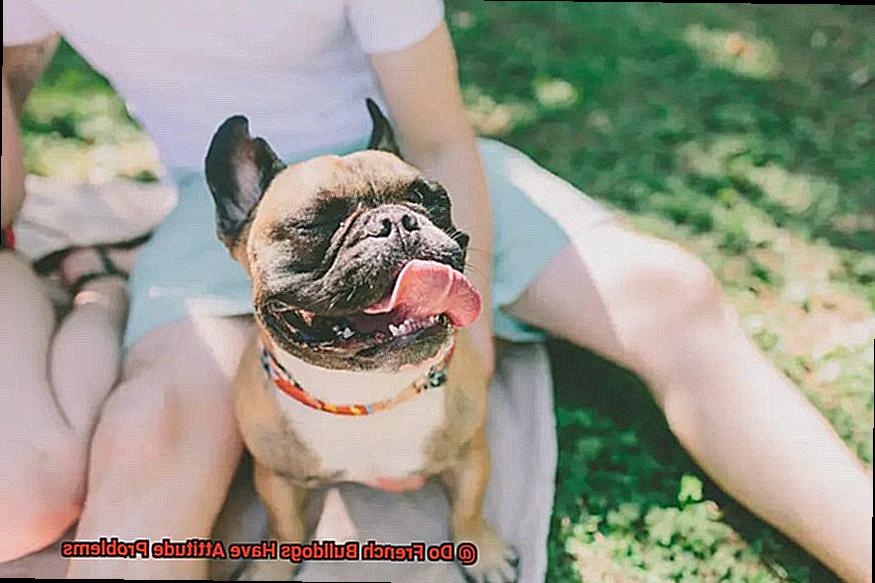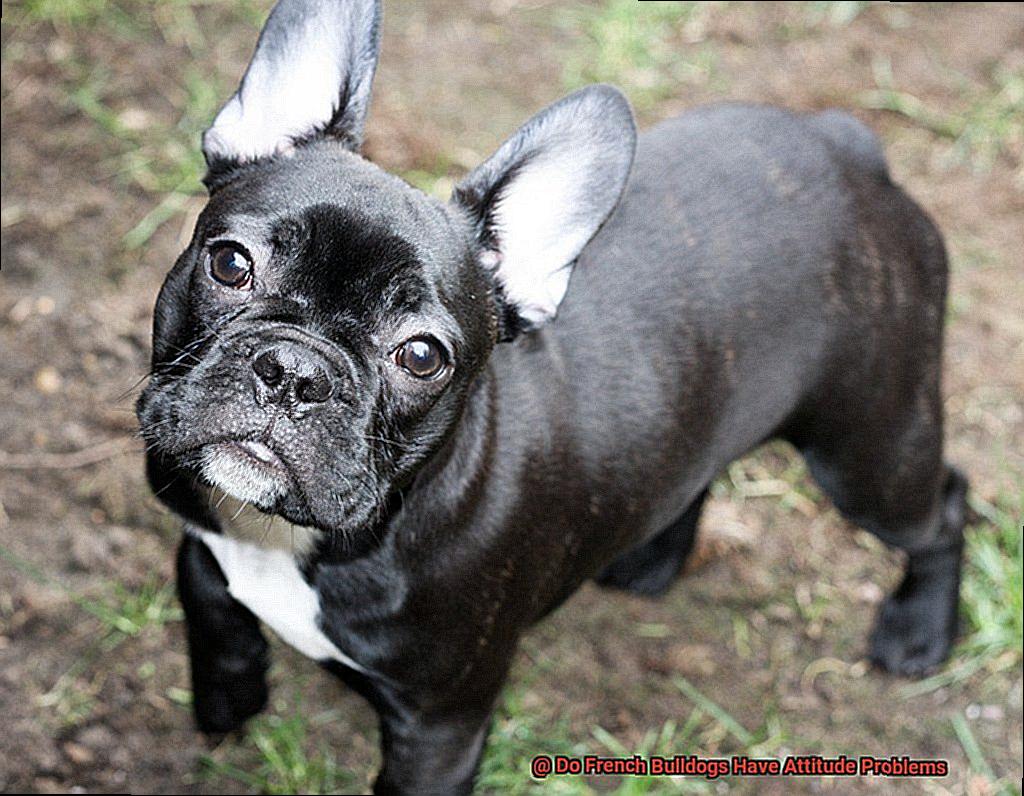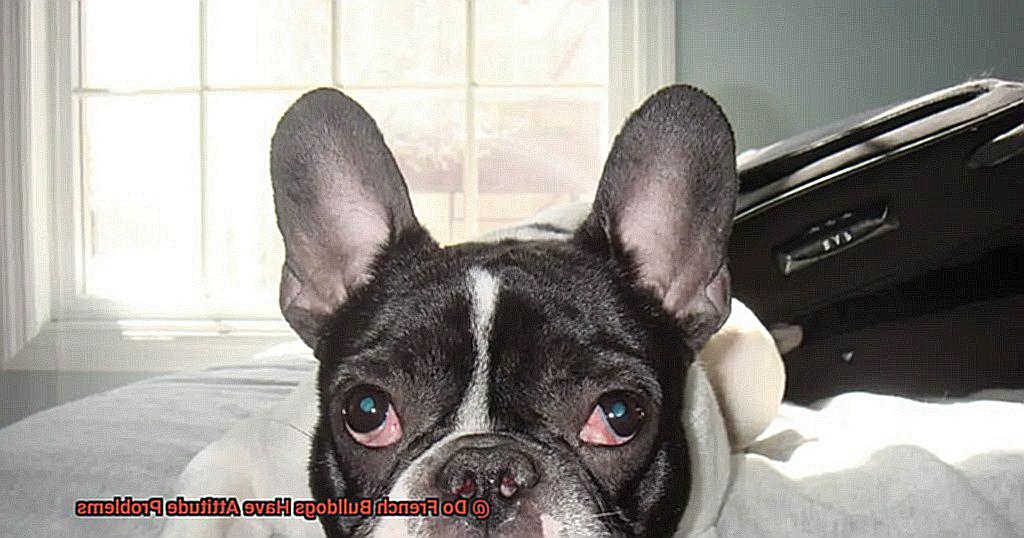Do French Bulldogs Have Attitude Problems?
Welcome to our blog post where we delve into the captivating question: Do French Bulldogs have attitude problems?
If you’re a dog lover or thinking about adding one of these cuties to your family, you might have heard whispers about their feisty nature. But is it really fair to paint them as having attitude problems?
So, grab a comfy seat and join us on this adventure as we unravel the personality and attitudes of these adorable four-legged pals.
Do French Bulldogs have attitude problems
Contents
- 1 Do French Bulldogs have attitude problems
- 2 Understanding the Unique Personality of French Bulldogs
- 3 Common Behaviors That May Be Mistaken as Attitude Problems
- 4 Training and Socialization to Manage Potential Attitude Problems
- 5 Stubbornness in French Bulldogs
- 5.1 The Independent Spirit: Understanding their Strong-willed Nature
- 5.2 Sensitivity Matters: Addressing Anxiety and Overwhelm
- 5.3 Individual Differences: Personality and Experiences
- 5.4 Training Strategies: Patience, Consistency, and Positive Reinforcement
- 5.5 Mental Stimulation and Physical Exercise: Fulfilling their Needs
- 6 Possessiveness in French Bulldogs
- 7 Territorial Aggression in French Bulldogs
- 8 Snoring and Snorting Sounds That May Be Misinterpreted as Attitude Problems
- 9 Conclusion
The truth is, French Bulldogs, like any other dog, can exhibit certain behavioral issues. However, it’s important to understand the specific traits and characteristics of French Bulldogs to determine if they are more prone to attitude problems.
- Stubbornness: One common trait of French Bulldogs is their stubbornness. They may resist commands or become uncooperative when they don’t want to do something. This can sometimes be mistaken as an attitude problem, but it’s simply their independent nature shining through.
- Sensitivity: French Bulldogs are highly sensitive to their surroundings and can easily pick up on changes in their environment or the mood of their owners. If they sense tension or stress, they may react by displaying unwanted behaviors such as excessive barking or growling. Creating a calm and positive environment is essential in preventing these issues.
- Attention-seeking: French Bulldogs have a love for attention and can become demanding when it comes to receiving affection. Some owners may interpret this behavior as an attitude problem, but it’s actually just their natural inclination for seeking companionship.
- Training and socialization: Proper training and socialization are key in addressing any potential attitude problems in French Bulldogs. Positive reinforcement techniques and consistency should be used during early training sessions to help them understand desired behaviors.
It’s important to note that not all French Bulldogs will exhibit attitude problems. Each dog has its own unique personality and temperament, which can vary even within the same breed. With proper care, training, and socialization, the likelihood of attitude problems can be significantly reduced.
If you’re experiencing difficulties with your French Bulldog’s behavior, seeking professional guidance from a dog trainer or behaviorist can be beneficial. They can provide personalized strategies and techniques to address specific issues and help foster a positive relationship between you and your furry friend.
Understanding the Unique Personality of French Bulldogs
So you’ve got yourself a lovable French Bulldog, huh? Well, get ready for some unique and sometimes quirky personality traits. Understanding these distinct characteristics is essential for navigating their behaviors and addressing any potential attitude problems. Let’s dive into what makes French Bulldogs so special.
Affectionate and Loyal Companions
French Bulldogs are known for their incredible affectionate nature. They form strong bonds with their owners and thrive on human companionship. This means they’ll shower you with love and loyalty like no other. However, be aware that this affection can sometimes turn into separation anxiety if they’re left alone for too long. This may manifest as excessive barking, destructive behavior, or even aggression. So make sure to spend quality time with your Frenchie and provide them with the attention they crave.
Playful Energizer Bunnies
Despite their small size, French Bulldogs are bursting with energy and love to play. They enjoy engaging in activities with their owners and need regular exercise and mental stimulation to stay happy and content. Without proper exercise, they may become restless or hyperactive, even exhibiting aggression. So grab those toys, go for walks, and keep them entertained to avoid any attitude problems.
Intelligent Yet Stubborn
French Bulldogs are intelligent creatures, but boy can they be stubborn. This intelligence allows them to learn quickly, but it also means they might try to assert their own will if not properly trained and socialized. This stubbornness can lead to attitude problems like refusing commands or displaying defiant behavior. So be patient, consistent, and use positive reinforcement when training your Frenchie to ensure they develop good manners.
Social Butterflies (Most of the Time)
French Bulldogs are generally social animals who get along well with other pets and are often friendly towards strangers. However, individual personalities can vary, so proper socialization from a young age is crucial. This will help prevent any attitude problems related to fear or aggression towards other animals or people. So introduce them to various environments, people, and animals early on to ensure they become well-rounded and confident companions.
Expressive Faces and Unique Vocalizations
One of the most charming traits of French Bulldogs is their expressive faces and unique vocalizations. From grunts to snorts and even howls, these sounds are all part of their adorable charm. However, excessive barking can become an attitude problem if not managed properly. Learn to differentiate between their various vocalizations and address any excessive barking through positive reinforcement training.
Common Behaviors That May Be Mistaken as Attitude Problems
French Bulldogs are known for their unique personalities and behaviors, which can sometimes be misunderstood as attitude problems. In this section, we will explore some of the common behaviors that may be mistaken as attitude problems in French Bulldogs and provide insights on how to better understand and address these behaviors.
Stubbornness
French Bulldogs have a reputation for being stubborn and independent, which can lead to frustration for their owners. However, it’s important to remember that this is a breed trait and not necessarily a sign of a bad attitude. To overcome this behavior, positive reinforcement training techniques are key. By using rewards and treats, you can motivate your French Bulldog to follow commands and overcome their stubborn streak.
Territoriality
Another behavior that may be misinterpreted as an attitude problem is territoriality. French Bulldogs can be protective of their space and may exhibit possessive behaviors towards their toys or food. This can sometimes come across as aggression or defiance, but it’s important to understand that they are simply expressing their natural instincts. Providing clear boundaries and consistent rules can help alleviate this behavior.
Vocalizations
French Bulldogs are also known for being vocal. They have a wide range of vocalizations, from barks and howls to grunts and snorts. This can sometimes be mistaken as excessive barking or complaining, but it’s just their way of communicating. It’s important to listen to their vocalizations and try to understand what they are trying to convey. For example, a low growl may indicate discomfort or fear, while a high-pitched bark could mean excitement or playfulness.
Selective Affection
Another behavior that may be misunderstood as an attitude problem is their tendency to be selective with their affection. While French Bulldogs are generally affectionate and loving, they can also be reserved with strangers or unfamiliar people. This can sometimes be perceived as aloofness or indifference, but it’s important to remember that they are just cautious by nature. By giving them time to warm up to new people and providing positive experiences, their trust and affection will gradually grow.
Training Challenges
Finally, French Bulldogs have a reputation for being stubborn when it comes to training. They can be a bit challenging to train due to their independent nature, but with patience and consistency, they can learn and follow commands. It’s crucial not to mistake their initial resistance as an attitude problem but rather as a characteristic trait that requires tailored training methods. Using positive reinforcement techniques and short, engaging training sessions can help overcome this challenge.
Training and Socialization to Manage Potential Attitude Problems
French Bulldogs are lovable and unique companions, but like any other dog breed, they can develop attitude problems if not properly trained and socialized. In this blog post, we will explore effective techniques to manage potential attitude problems in French Bulldogs through training and socialization.
Start Training Early:
- Begin training your French Bulldog from a young age to establish good behavior patterns and obedience.
- Use positive reinforcement techniques such as rewards and praise to encourage desired behaviors.
- Consistency is key – establish clear rules and boundaries for your dog and ensure everyone in the household follows them consistently.
Socialization is Crucial:
- Expose your French Bulldog to various people, animals, and environments from a young age.
- This helps them develop confidence and adaptability, minimizing fear-based aggression or territorial behavior.
- Gradually introduce new situations and individuals, ensuring positive experiences for your dog.
Teach Basic Obedience Commands:
- Teach your French Bulldog basic commands like sit, stay, and come.
- This establishes clear communication between you and your dog and strengthens the bond between you.
- Use positive reinforcement techniques to reward desired behaviors.
Provide Mental Stimulation:
- French Bulldogs need mental stimulation to prevent boredom-related behavior issues.
- Engage them with puzzle toys, interactive games, and regular exercise to keep their minds active.
- This prevents destructive or attention-seeking behaviors.
Seek Professional Help if Needed:
- If your French Bulldog continues to exhibit attitude problems despite proper training and socialization, consider seeking professional help from a dog trainer or behaviorist.
- They can assess the specific issues and provide tailored guidance and solutions to address them effectively.

Stubbornness in French Bulldogs
In this blog post, we will explore the causes of their stubborn nature and provide practical tips to help you overcome these hurdles. With our expertise and your dedication, you can build a strong bond and transform your French Bulldog into a well-behaved companion.
The Independent Spirit: Understanding their Strong-willed Nature
- French Bulldogs have an inherent desire to please themselves, which can make training a bit challenging.
- They prioritize their own needs and desires over following commands, seeking immediate benefits for themselves.
- This strong-willed nature contributes to their stubbornness but is also a testament to their intelligence and independent personality.
Sensitivity Matters: Addressing Anxiety and Overwhelm
- French Bulldogs are highly sensitive dogs, easily affected by their surroundings.
- When faced with uncomfortable or anxious situations, they may resist or refuse commands.
- Recognizing their sensitivity and providing a safe and calm environment can help alleviate their stubbornness.
Individual Differences: Personality and Experiences
- Not all French Bulldogs display the same level of stubborn behavior.
- Each dog has unique personality traits and experiences that can influence their behavior.
- Some may be more compliant and easier to train, while others require more patience and consistency.
Training Strategies: Patience, Consistency, and Positive Reinforcement
- Establish clear boundaries and consistent training from an early age.
- Utilize positive reinforcement techniques such as rewards and praise to motivate your French Bulldog.
- Keep training sessions short, engaging, and tailored to their shorter attention spans.
Mental Stimulation and Physical Exercise: Fulfilling their Needs
- Provide mental stimulation through interactive toys and games to prevent boredom.
- Engage in regular physical exercise to channel their energy in a positive way.
- A tired French Bulldog is less likely to exhibit stubborn behavior.
Possessiveness in French Bulldogs
French Bulldogs are known for their loving and loyal nature, but they can also exhibit possessive behavior. Understanding the potential causes of this behavior can help you prevent or manage it effectively.
- Attachment and Loyalty: French Bulldogs form strong bonds with their owners and can become possessive of their time and attention. They may show signs of jealousy when someone else receives attention, such as nudging or trying to push themselves between the owner and the source of attention.
- Resource Guarding: Possessiveness in French Bulldogs can extend to their toys, food, and other objects they consider as theirs. They may growl, snap, or become territorial if someone tries to take these items away. This behavior is a result of their instinct to protect their resources.
- Lack of Socialization: Proper socialization is crucial for French Bulldogs to develop good manners and learn to share. If they have not been exposed to different people, animals, and environments during their early development stages, they may be more prone to possessive behavior.
Managing Possessive Behavior in French Bulldogs
- Establish Clear Boundaries: Set rules and boundaries regarding resource guarding from a young age. Teach your French Bulldog that it is not necessary to guard their possessions by using positive reinforcement techniques.
- Training and Socialization: Enroll your French Bulldog in obedience training classes where they can learn basic commands and interact with other dogs. This will help them become more comfortable with sharing and reduce possessive tendencies.
- Consistency and Positive Reinforcement: Consistently reinforce positive behaviors and reward your French Bulldog for good manners. Use treats, praise, and playtime as rewards when they display non-possessive behavior.
- Seek Professional Help: If your French Bulldog’s possessive behavior persists or worsens despite your efforts, consult a professional dog trainer or behaviorist. They can provide personalized guidance and techniques to address the behavior effectively.

Territorial Aggression in French Bulldogs
French Bulldogs are undoubtedly adorable and loving companions, but they can occasionally exhibit territorial aggression. As a responsible Frenchie owner, it’s crucial to understand the signs, causes, and effective solutions for this behavior. In this blog post, we’ll delve into the world of territorial aggression in French Bulldogs and provide you with practical tips to address this issue.
Understanding Territorial Aggression in French Bulldogs:
Territorial aggression is a natural instinct for dogs, including French Bulldogs. It stems from their loyalty and protective nature towards their family and belongings. Some common signs to watch out for include growling, barking, lunging, or even biting when someone or something encroaches on their perceived territory. Your Frenchie may also display defensive body language, such as raised hackles or a stiff posture.

Causes of Territorial Aggression:
Several factors contribute to territorial aggression in French Bulldogs. These can include a lack of proper socialization during puppyhood, insecurity, fear, or previous negative experiences. It’s essential to identify the underlying cause(s) of your Frenchie’s territorial behavior to address it effectively.
Solutions for Territorial Aggression:
- Early Intervention: Addressing territorial aggression early on is crucial to prevent it from escalating into more severe issues. Seek professional assistance from a certified dog trainer or behaviorist who specializes in aggression management.
- Desensitization and Counterconditioning: One effective method is desensitizing your Frenchie to the triggers that elicit territorial behavior. Gradually expose your dog to the stimuli while rewarding calm and relaxed behavior. Over time, they will learn that strangers or other dogs pose no threat to their territory.
- Consistency and Positive Reinforcement: Maintain consistency in your training approach and reinforce positive behaviors consistently. Avoid punitive methods, as they can exacerbate the problem and harm the bond between you and your Frenchie.
- Seek Professional Guidance: If you’re struggling to manage your Frenchie’s territorial aggression, don’t hesitate to seek guidance from a professional dog trainer or behaviorist. They can provide personalized advice and training techniques tailored to your Frenchie’s needs.
Territorial aggression in French Bulldogs can be managed and controlled with the right approach.
By understanding the signs, addressing the underlying causes, and implementing effective training methods, you can ensure a harmonious home environment for both you and your furry friend.
Remember, every Frenchie is unique, so patience and consistency are key in overcoming this behavioral challenge.
Snoring and Snorting Sounds That May Be Misinterpreted as Attitude Problems
French Bulldogs are beloved for their adorable appearance and affectionate nature. However, their unique breathing patterns and noises can sometimes be misunderstood as attitude problems. In this section, we will explore why snoring and snorting sounds made by French Bulldogs should not be misinterpreted as signs of aggression or disobedience.
Anatomy Matters
French Bulldogs have a distinct physical characteristic known as a brachycephalic skull shape. This means they have a shortened nose and airways compared to other dog breeds. While this feature gives them their cute “smooshed” face, it also predisposes them to respiratory issues.
Snorting: Not an Attitude Problem
Snorting sounds made by French Bulldogs are often misconstrued as signs of aggression or irritation. However, these noises are actually a result of their narrowed airways. French Bulldogs may struggle to breathe properly, especially during exercise or when excited, leading to snorting sounds as they try to intake more air.
Snoring: Just a Naptime Symptom
Snoring is another common occurrence in French Bulldogs, particularly when they are sleeping or lying down. The relaxed muscles in their throat can obstruct the airway, causing them to snore audibly. It’s important to note that this is not a behavior issue but rather a consequence of their unique anatomy.
Differentiating Between Natural Sounds and Behavior Problems
It is crucial for French Bulldog owners to differentiate between the natural breathing sounds of their pet and actual attitude problems. Misinterpreting snoring and snorting as signs of aggression or disobedience can lead to misunderstandings and unnecessary disciplinary actions.
Seek Professional Guidance
If you notice your French Bulldog making excessive snoring or snorting sounds, it is recommended to consult with a veterinarian. They can assess your dog’s respiratory health and provide guidance on managing any potential breathing difficulties. In some cases, corrective measures such as surgery may be recommended to alleviate breathing issues and improve overall well-being.
Understanding Your French Bulldog’s Quirks
In conclusion, snoring and snorting sounds made by French Bulldogs should not be misinterpreted as attitude problems. These noises are a natural consequence of their brachycephalic skull shape and narrowed airways. By understanding and accepting these unique traits, owners can appreciate their French Bulldogs’ quirks without misjudging their behavior.
Conclusion
In conclusion, it is clear that French Bulldogs can indeed have attitude problems.
Their stubbornness and independent nature can sometimes come across as aloof or even defiant. However, it is important to remember that not all French Bulldogs exhibit these behaviors, and proper training and socialization can greatly mitigate any potential attitude issues.
So, if you’re considering getting a French Bulldog, be prepared for their unique personality traits and be ready to put in the effort to shape their behavior positively.




